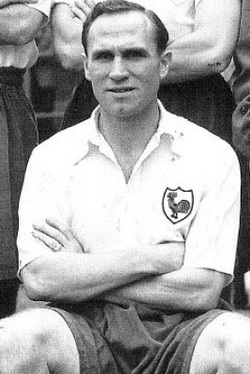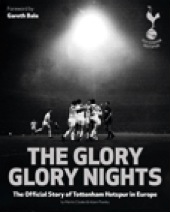 The men who made Spurs The latest in Martin Cloake’s series about some of the key figures who made the club what it is. Peter McWilliam Peter McWilliam is the second of the four managers who established The Spurs Way, coming after John Cameron [ED – LINK TO CAMERON PIECE] and laying the ground for Arthur Rowe and Bill Nicholson. McWilliam was appointed in December 1912, after a four-year period in which the Spurs directors had taken on the manager’s responsibilities. After 10 defeats and three draws in the first 13 games of the 1912/13 season, shareholder pressure forced the directors to take on a full-time manager. McWilliam had been one of the great players of the early game. He had captained Scotland and played a key role as half-back in the great Newcastle United team that won three League championships and reached four FA Cup Finals in the years between 1905 and 1910. As manager of Spurs, he immediately began to implement the attacking style of play the fans demanded, but success did not come quickly. The team struggled, then came the First World War, after which the dubious circumstances of league reorganisation saw Spurs relegated and Arsenal given the club’s place in the First Division. McWilliam’s team walked the Second Division, securing a record 70-points to bounce back into the top flight at the first time of asking.
The following season, a team featuring Arthur Grimsdell, Fanny Walden, Tommy Clay, Jimmy Dimmock and the great Jimmy Seed won the FA Cup, beating Woverhampton Wanderers 1-0 in the driving rain in front of 72,000 spectators at Stamford Bridge, Dimmock scoring the winner in the 65th minute. Spurs narrowly missed out on the League championship the following year, finishing second to Liverpool. It was the highest league position ever achieved by a London team. Spurs also reached the semi-final of the FA Cup that season, losing 2-1 to Preston North End. After that, McWilliam’s first great team began to break up, and the way both manager and club dealt with this was to lay the template for future development. McWilliam had come to an arrangement with non-League Northfleet United to adopt the club, based in Kent to the south of London, as a nursery side. Here, players would learn the basics, not only of how to play the game, but how to play the game the way McWilliam thought it should be played. He thought the game should be kept simple, valued passing and movement, and wanted intelligent players who could think for themselves on the pitch. His approach developed the tradition established by Cameron, establishing what today would be called a distinct brand identity. The arrangement with Northfleet also meant Spurs were able to save a fortune on recruiting players, instead bringing youngsters through the system and into the first team. This was just as well, because the Spurs directors did not like spending big money on players. Although Spurs did not match the successes of the early 1920s, McWilliam managed to keep them near the top of the game, and playing stylish football. All this, you would think, would mean he had the full backing of the club’s directors. But, not for the first time, a combination of parsimony and arrogance from the board led to Spurs shooting themselves in the foot. In 1926, Middlesbrough offered McWilliam the then handsome sum of £1,500 a year to take over as manager. He didn’t want to leave Spurs, so instead asked his board to increase his wage from £850 to £1,000 a year. They refused, McWilliam resigned, and his resignation was accepted. He went on to lead Boro into the First Division. Spurs went into a long decline. A year letter, Jimmy Seed was sold to Sheffield Wednesday, and inspired the Yorkshire club to two victories that saw Spurs relegated. Wednesday, with Seed a key player, went on to win the League title two years running. Spurs languished in the Second Division for five seasons. Promotion to the top flight was achieved in 1933, but Spurs were relegated again two seasons later and would not rise again until 1949. McWilliam was persuaded back to Spurs, after turning down an offer from Arsenal to succeed that club’s great manager Herbert Chapman, in 1938 and had an immediate effect. In the year before the Second World War brought regular football competition to a halt, he promoted two men from the Northfleet nursery who were to have a profound impact on Tottenham Hotspur’s future; Ron Burgess and Bill Nicholson. McWilliam continued at the helm of Spurs until 1942, when his wife’s illness led him to decide to retire from football. He remains the club’s longest serving manager, having been in charge for 19 years over his two spells. He continued Cameron’s work in establishing The Spurs Way and, through the nursery system he set up, nurtured players who would go on to become some of the most influential names in the game. One was Vic Buckingham, who would go on to coach Ajax of Amsterdam, lay the foundations of the system that came to be known as Total Football, and discover a young, gifted footballer called Johan Cruyff. Buckingham was given great encouragement by another product of the Northfleet academy, someone who also took McWilliam’s philosophy and updated it to produce a potent approach to football. That someone was Arthur Rowe, and we shall be hearing more of him very soon. About the Author: Martin Cloake is a writer and editor who lives in London, UK. A Spurs season ticket holder, he has followed the team since 1970, travelling all over the UK and Europe to support them. His latest book, Sound of the crowd, is a look at changing fan culture in England with an emphasis on Spurs supporters. He is a regular contributor to Spurs fansites and podcasts. He also writes more widely on football and the football business for a variety of publications including the New Statesman. Martin Cloake’s books about Tottenham Hotspur, including ebooks that can be downloaded directly to your computer or mobile device, can be ordered from his bookstore. View Full Bio Follow @MartinCloake More by Martin Cloake
4 Comments
David Potter
14/7/2016 03:42:16 am
Hello, Martin. Enjoying your stuff about Peter McWilliam. I am dabbling with the idea if writing a biography of Peter. I am a Newcastle supporter and Scottish. He seems to have been a marvellous player and Manager as well, and I feel it would be worth doing.
Reply
Dennis Thompson
14/9/2016 11:15:01 pm
Hi David, for the first time (just today) I find out about the real greatness of "Peter the Great" and only through intrigue. My wife's dad's dad is pictured standing beside Peter McWilliam in the Newcastle United team photo 1906-1907, which she now has handed down to her. Her grandad was James (Jimmy) Tildesley who played 22 first team games for Newcastle United between 1903 and 1906.
Reply
David Potter
28/9/2016 03:13:57 am
Interesting, Dennis! As you say, this was a great side. And Peter was the greatest of them all, I believe. Still thinking about this.
Reply
28/9/2016 03:14:37 am
Interesting, Dennis! As you say, this was a great side. And Peter was the greatest of them all, I believe. Still thinking about this.
Reply
Leave a Reply. |
Features
Flying Down to Rio History of T.H.F.C. Tribute to Bill Nicholson Talking Tottenham Early Legends The Road to Turin International Connections Hotspur Towers Most Read Articles
The 100 Year War Interview with Marina Sirtis A Long Dark Shadow By Royal Appointment School Report: An Insight into the Younger Eric Dier Dear Jimmy All Change At Spurs Hotspur Towers History Of THFC: Part 1 Passage to India: Rohan Rickets Thanks For The Memories Our Tommy Carroll The AVB Files: Part1 The Lilywhites You The Jury The Hand Of Hugo Connection - Argentina Creating a Reputation One Hotspur Archives
August 2018
Categories
All
|
 RSS Feed
RSS Feed

